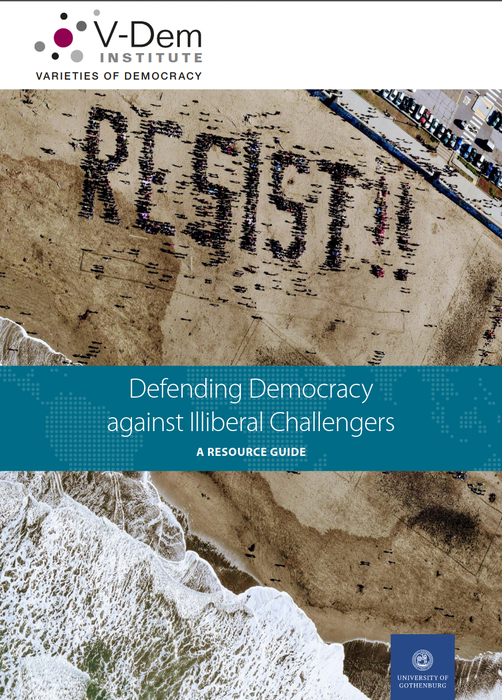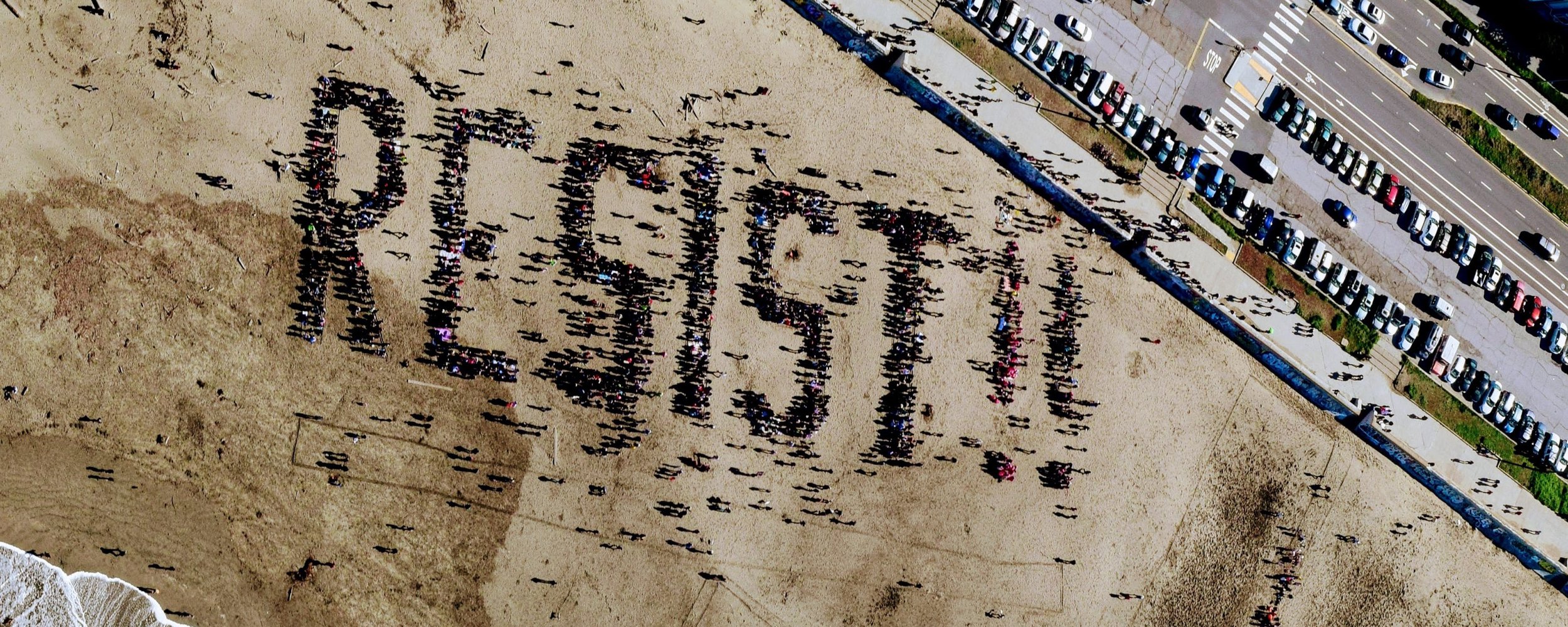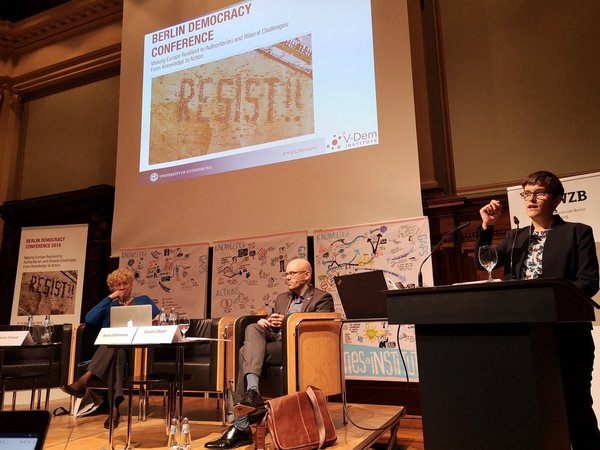Democratic Resilience
Making Europe Resilient to Authoritarian and Illiberal Challenges: From Knowledge to Action

The V-Dem Institute launched a project on democratic resilience as part of its work on autocratization – the decline of democracy. Our Resource Guide “Defending Democracy against Illiberal Challengers” provides an overview of cutting-edge research and innovative ideas that democratic actors can enact for strengthening democracy. Democratic actors including politicians, activists, and journalists face dilemmas every day. This Resource Guide systematically analyzes strategies for addressing these dilemmas based on the available research evidence.
As a first step, V-Dem organized the Berlin Democracy Conference, November 11-12, 2019, in collaboration with the Open Society Foundation (OSF) and the Social Science Research Center Berlin (WZB). It brought together 100s key stakeholders who normally do not attend the same conferences: leading social scientists and decision-makers from key European civil society organizations and state institutions. The participants learned about current state-of-the-art democracy research, drew policy recommendations for civic education, political parties as well as public space. Together, academics and practitioners outlined ideas to facilitate future research and knowledge transfer.
The detailed conference videos are available here. OpenDemocracy has published a piece by Anna Lührmann, former V-Dem Deputy Director, outlining initial thoughts on the topic.
BDC 2019 – Resilient to Authoritarian and Illiberal Challenges
The opening plenary started with some mixed news. Anna Lührmann, Deputy Director of the V-Dem Institute, highlighted that despite mounting challenges, democracy in Europe is going strong. In most European countries, democratic institutions remain stable. Europe has the highest average regional level of liberal democracy in the world, according to V-Dem data.
At the same time, democratic erosion is a real threat in Europe. In four out of 31 European countries – Bulgaria, Czech Republic, Hungary, and Poland – illiberals have so far succeeded in weakening liberal democratic institutions significantly. Moreover, illiberal and authoritarian-leaning parties are on the rise in almost all European countries, threatening democratic institutions and norms. Wolfgang Merkel, Director of the democracy and democratization research unit at WZB, emphasized that while European democracies are vulnerable, they are not in existential crisis.
Matthew MacWilliams (University of Massachusetts Amherst) shared his research showing that in opinion surveys, voters for such parties hold authoritarian values and support far-right ideologies. In order to reach such voters, democrats need to understand their mindsets and better tailor their activities and messages.
In the subsequent six ‘Knowledge Workshops’, scholars and practitioners took a first step towards this end. One workshop on ‘the Extent of the Authoritarian Challenge’ concluded that democratic erosion makes life difficult for journalists, opposition politicians and activists in several countries. Thus, recent declines in expert-coded data sets from institutes such as V-Dem, Bertelsmann Foundation, and Freedom House are more than a mere reflection of an increasingly pessimistic public discourse. Often, autocratizers erode the informal democratic norms, a process which in turn helps them to win elections and come to power. At the same time, Melis Laebens (Yale University) showed that elections played a key role in instances in which autocratizers were stopped.
Overall, the ‘Knowledge Workshops’ were an exercise in the falsification of hypotheses of what might work to stop autocratization, as Staffan I. Lindberg, Director of the V-Dem Institute, summarized. Scholars presented several papers showing that a particular strategy, such as copying the issues of far-right parties, pro-democratic mass protests or judicial intervention, did not work in stopping illiberals. Autocratization can rarely be stopped once it starts to affect the core of the regime.
One reason for this challenge is the societal polarization that accompanies and fuels autocratization. Illiberals divide the society into their supporters and enemies. Such polarization is pernicious – as Jennifer McCoy (Georgia State University) emphasized because it derails any trusting interaction between citizens with different views – unlike normal debates about policy preferences. Pernicious polarization enables illiberals to dominate the public discourse and shield their supporters from information that challenges their propaganda. Citizens that lack trust in other citizens and the political process are more likely to support policies, which challenge the rules and institutions that guarantee an impartial and fair political contest. Democrats react fiercely to such violations of democratic norms, which again pushes illiberals to stand closer together.
How to stop this vicious circle?
The second conference day started with inspirations from model initiatives to this end. For instance, Komons analyses the media environment in Spain to help democratic groups target their message better. Aktion Zivilcourage provides local solutions to strengthen democratic civil society in Eastern Germany. The Volksverpetzer counters narratives, facts and frames by the far-right party Alternative für Deutschland (AfD) online.
Thomas Carothers (Carnegie Endowment) offered some ideas for what Europeans could learn from the democratic experiences in non-European countries. In particular, he emphasized three lessons for successful grassroots mobilization against autocrats in power. First, pointing to South Korea and Guatemala as success stories, he argued that activists should focus on combating corruption as a mobilizing force. Second, it seems that mobilization mainly works around specific thresholds and junctures, such as manipulated elections or attempts to remove term-limits. Thirdly, the Sudanese case suggests that professional organizations (e.g. doctors’ unions) may help to overcome collective action problems. He also pointed to successful civil society projects that brought together citizens across dividing lines in Kenya and an impactful coalition of think tanks, grass-roots organization and judges against state capture in South Africa.
During the concluding session, Anna Lührmann (host, V-Dem) and panelists Daniel Ziblatt (Harvard University) and Gesine Schwan (Humboldt-Viadrina Governance Platform) engaged in a lively debate with the audience. Daniel Ziblatt analyzed that the erosion of the gatekeeper function of this political establishment had opened the doors for illiberal and authoritarian actors. Democratic actors can either treat them like any other political actors or address them with the help of instruments from the realm of militant democracy “wehrhafte Demokratie”, informal norms, civic education and social mobilization. Gesine Schwan emphasized that multi-level solutions are needed to deal with the challenges that emerge from today’s globalized economy and that politicians should be more responsive to citizens.
Overall, the conference generated considerable “food for thought” and initial ideas, but also highlighted major knowledge gaps: How can democrats delegitimize illiberal and authoritarian political actors without enhancing societal polarization? What role do emotions play in shaping anti-democratic behavior and how can democrats be more emphatic? What works in enhancing the resilience of democracies?
The Berlin Democracy Conference was only the beginning. Now it is up to scholars to address these research gaps and practitioners to transfer the knowledge into action.



